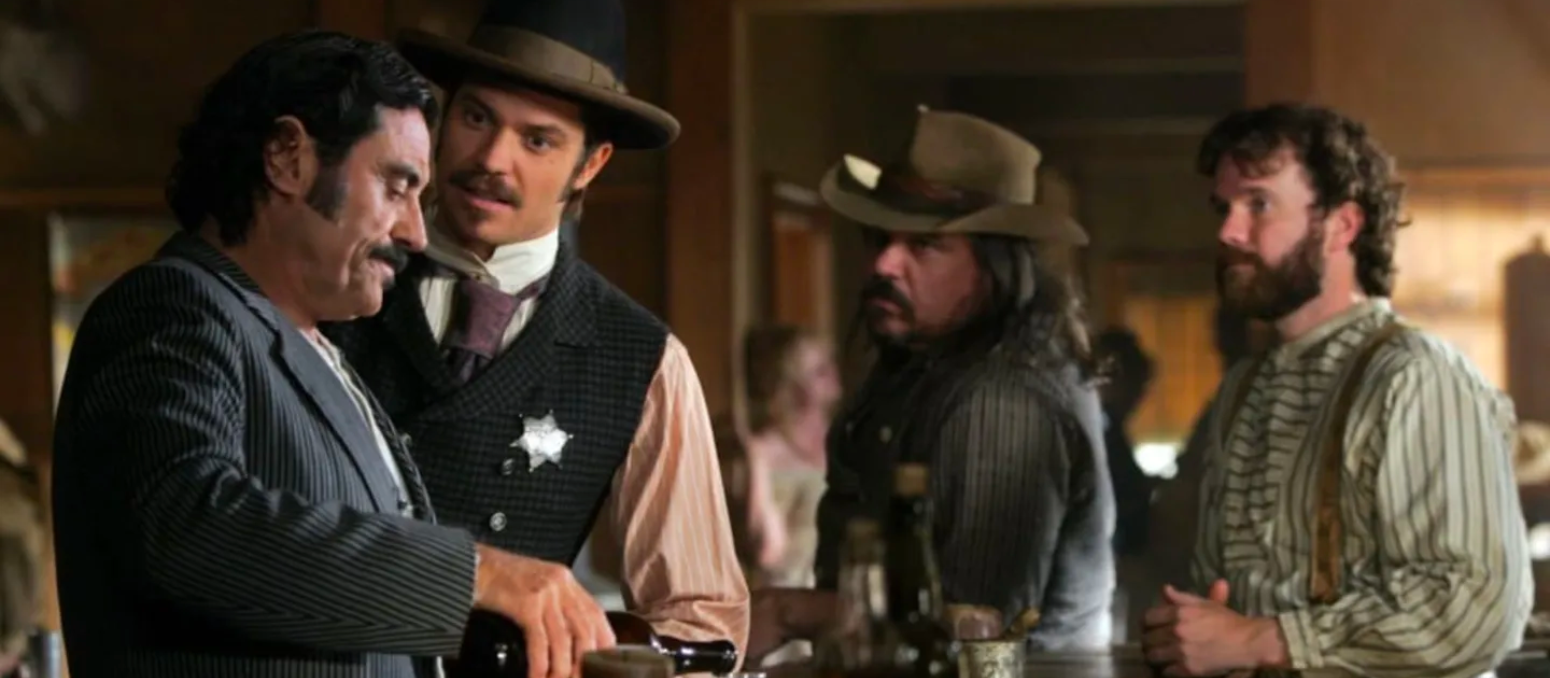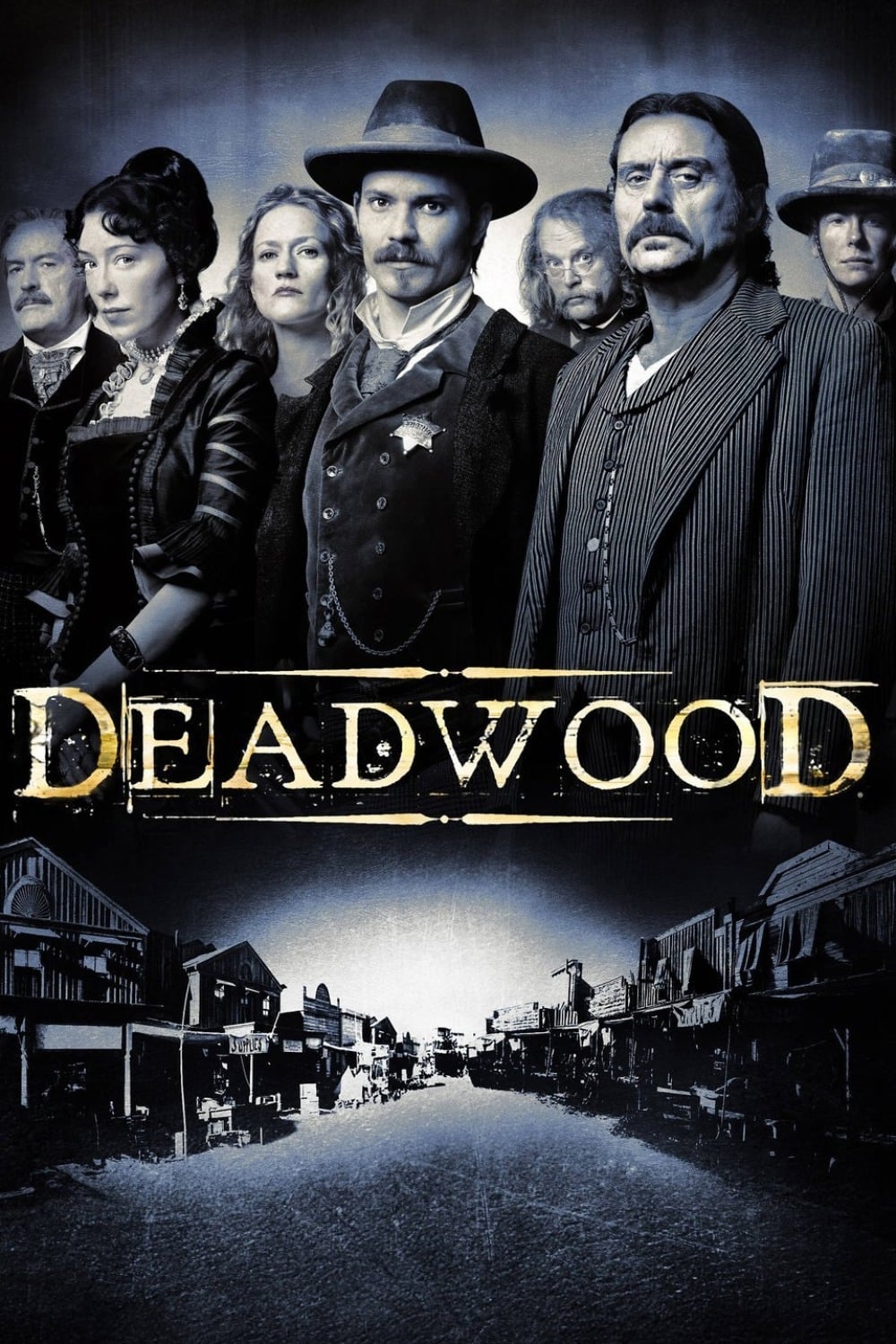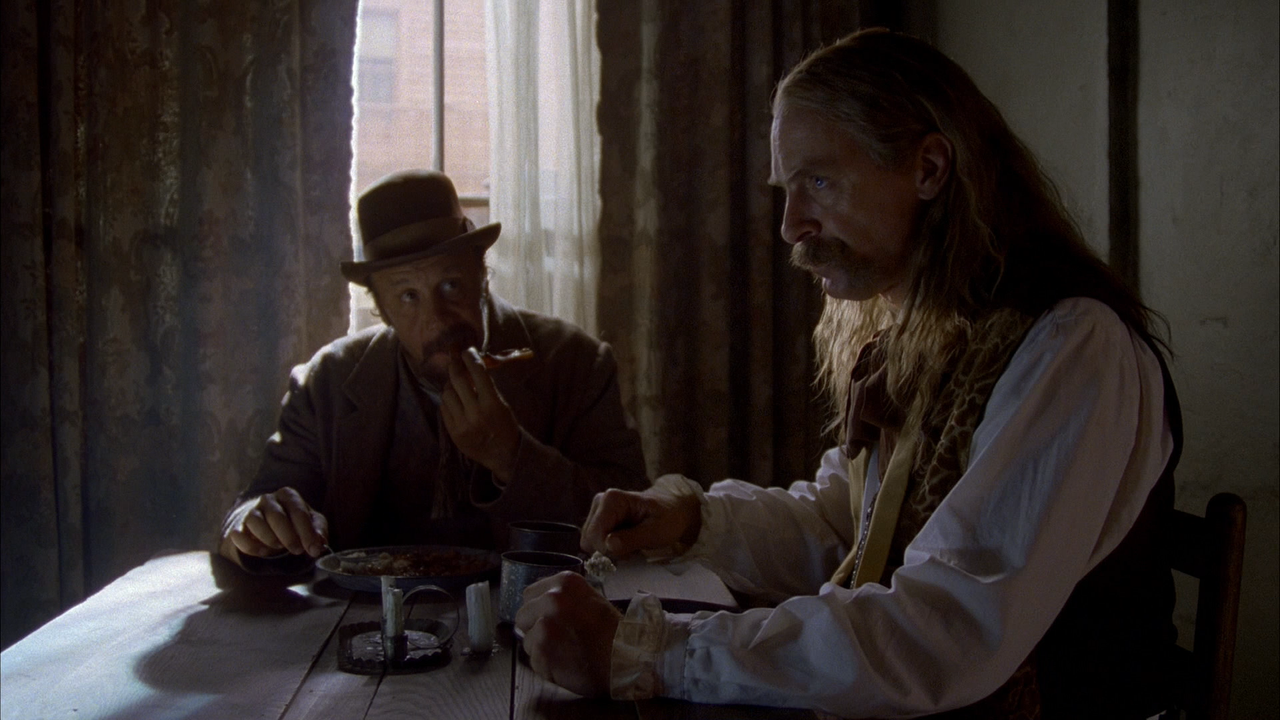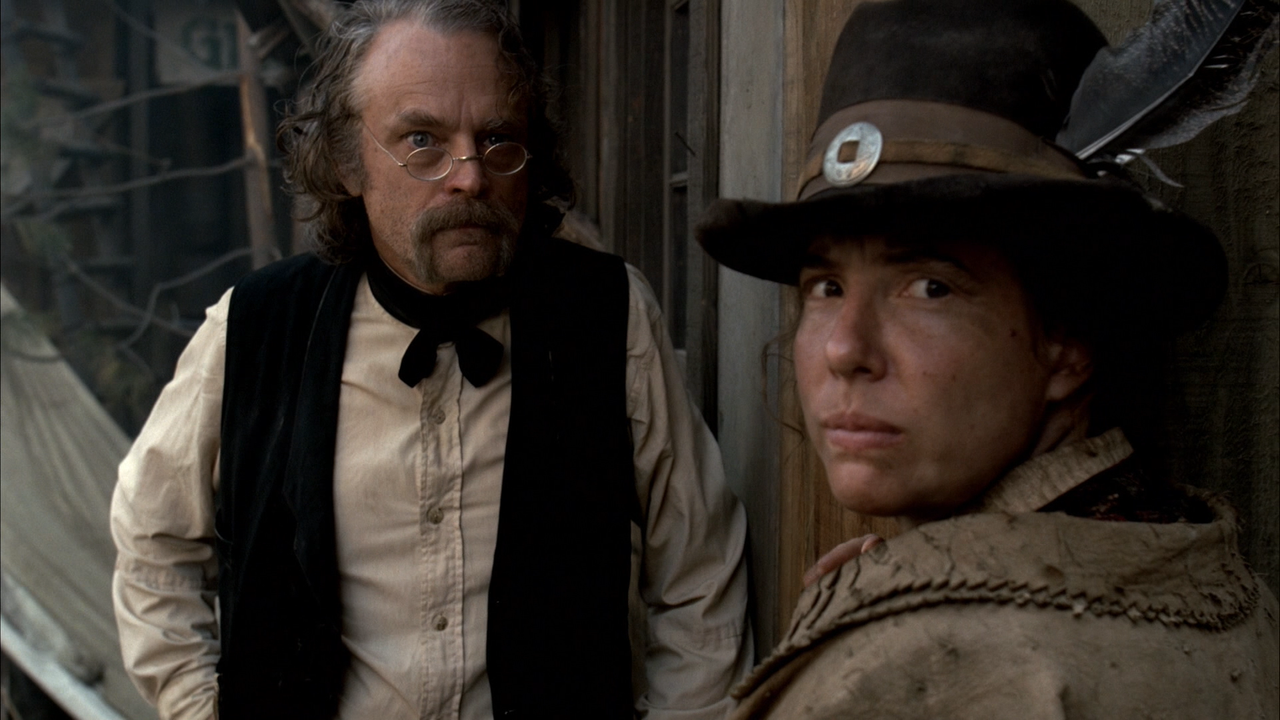

“Announcing your plans is a good way to hear God laugh.”
Like many HBO series, Deadwood was critically appreciated. But it didn’t really fit into the network’s lineup of original programming. When set against moody mob bosses, cranky television writers, experimental prisons, and polygamous marriages, the cuss-laden Shakespearean dialogue, slow-burning brutality, and utter depravity of Deadwood ensured it was the black sheep of the family. Despite its peculiarities, it succeeded on the back of David Milch’s magisterial storytelling and career-best work from an expansive cast of under-the-radar actors embodying some of the most memorable characters in television. At least, it did for a season or so, after which storylines started to meander, less compelling side characters elbowed their way into the spotlight, and viewership steadily declined. After three seasons, the powers that be elected to cease the expensive production, leaving an open parenthesis in which the myriad loose ends of Milch’s epic tapestry were left to fray into obscurity.
I am a sinner who does not expect forgiveness. But I am not a government official.
Set in the gold rush town of Deadwood, South Dakota, during the late 19th century (it opens just after the Battle of the Little Bighorn), the show centers on a loose collection of historical figures that were around during the camp’s formative years as anarchic chaos gradually took on the veneer of civilization. Among them are saloon/brothel owner Al Swearengen (Ian McShane) and sheriff Seth Bullock (Timothy Olyphant), whose contemptuous relationship forms the dramatic nucleus of the first season. A former Marshal, Bullock intends to turn over a new leaf by opening a hardware store in the fledgling camp with his partner Sol Star (John Hawkes), but soon after arriving finds himself instinctively assuming authority over the lawless, Godless territory, which predominantly serves as a sleazy hub for hard-living prospectors to spend their money on booze, women, and games of chance. Bullock soon befriends Wild Bill Hickock (Keith Carradine), along with Bill’s companions Charlie Utter (Dayton Callie) and Calamity Jane (Robin Weigert), and finds himself called upon to look after the affairs of widow Alma Garret (Molly Parker), whose husband (Timothy Omundson) meets an early demise while reconnoitering a newly-purchased gold claim.

Brutal violence is rampant in these early days of the camp, but even after the territory is annexed into the United States (commencing the inevitable encroachment of civil progress and political corruption), bloodshed remains the problem-solving technique of choice. Indeed, Swearengen’s right hand man Dan Dority (W. Earl Brown) is quite adept with a knife (as is Swearengen himself), and many of the players who pass through Deadwood are quick to resort to fisticuffs, blades, or sidearms. Jack McCall and Francis Wolcott (both played by Garret Dillahunt) each enter the town with murder on their minds. Ruthless bosses like Swearengen, rival Cy Tolliver (Powers Boothe), and later, magnate George Hearst (Gerald McRaney), prefer to employ a host of underlings to do the bulk of their dirty deeds for them. Mr. Wu’s (Keone Young) pigs receive plenty of work as a clandestine body disposal service in the heart of Chinatown, and just about every major character requires the services of Doc Cochran (Brad Dourif) at some point. Other prominent characters include the conniving hotelier E. B. Farnum (William Sanderson), mensch prospector Whitney Ellsworth (Jim Beaver), Swearengen’s loyal prostitute Trixie (Paula Malcomson), newspaper editor A. W. Merrick (Jeffrey Jones), fruity whoremonger Commissioner Jarry (Stephen Tobolowsky), and flamboyant theater troupe leader Jack Langrishe (Brian Cox).
Can’t you let me go to hell the way I want to?
If the previous few paragraphs read like little more than lists of names, that’s because the primary achievement of Deadwood, over and above the triumph of its setting and cutthroat atmosphere, is its adept handling of its enormous cast. The broad strokes of the drama trace the aims and machinations of Swearengen, Bullock, Tolliver, and other “camp elders” as they try to improve and protect their embryonic town, but Milch ingeniously weaves smaller arcs into the fabric of the larger story, fleshing out his entire cast with habits and ambitions and flaws. This attention to even the least significant characters allows what are essentially interludes in the main action to land with heft—the Reverend Smith’s (Ray McKinnon) slow decline in health and poignant death, Tom Nuttall’s (Leon Rippy) ill-fated bicycle ride, cardsharp Eddie’s (Ricky Jay) business loan to Joanie (Kim Dickens), telegraph operator Blazanov’s (Pasha Lychnikoff) friendship with Merrick, Johnny’s (Sean Bridgers) affections for Jen the prostitute (Jennifer Lutheran), Adams’ (Titus Welliver) duping at the hands of a Pinkerton agent (Sarah Paulson), Richardson’s (Ralph Richeson) pagan prayers to the deer gods, Doc dancing with the gimpy Jewel (Geri Jewell) in the leg brace he’s fashioned for her, the scornful interactions between Samuel Fields (Franklyn Ajaye) and Steve (Michael Harney). (Hmm, it looks like I’ve just written another list of names, haven’t I?) Even those instances where we’re treated to a montage of the many goings on around the camp are emotionally resonant, as if Swearengen’s idle people-gazing from his balcony actually has a palpable impact on his decision making. His occasional Faulkner-esque monologues, given while he’s under the rhythmic oral care of Dolly (Ashleigh Kizer) or in the presence of the Chief’s disembodied head, are similarly poignant. The wedding that closes out the second season is quite sentimental as well.

Moreover, Deadwood engrosses the viewer with its penchant for juxtaposing and even merging its strains of brutality with its impeccable language, to pleasantly varied results. Few will suggest the show is anything but heinously violent. Gouged eyeballs dangle from their sockets, children are killed in freak accidents, Indians are beheaded, a man is gored on a buck rack, messengers are shot or knifed, government officials are assassinated, dead prostitutes are burned. But in and amongst these gruesome episodes is a bevy of spellbinding intrigues, wherein the majority of characters speak with incredible verbosity, lacing their speech with archaic words (ambulator, dromedary, gratis, expectoration, offal, pugilist, inimical, atrabilious, and the like) and profanity (special attention is given to “cocksucker” and “fuck”). This singular and fluid blend lends incredible weight to consequential moments, but also proves outrageously funny in certain circumstances. There are endless forum threads where fans have traded favorite quotes from the series, and reading through them after having seen the show is a sure way to bring a smile to one’s face.
When I say ‘Fuck yourself, Sheriff,’ will you put that down to drunkenness, or a high estimate of your athleticism?
For this viewer, who’s now seen it through thrice (this last time in preparation to finally catch the long-awaited capstone film—Deadwood: The Movie), Deadwood remained totally compelling for its duration. For myself and many others the show’s cancellation will remain one of the big what-ifs of popular entertainment. How does Entourage get eight seasons while Deadwood, Carnivàle, and Rome get axed? Surely it belongs among the ranks of the greatest television of all time alongside The Wire and The Sopranos.